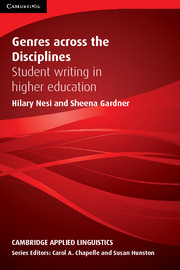Book contents
- Frontmatter
- Contents
- Series editors’ preface
- Abbreviations
- Acknowledgements
- Part I Investigating Student Writing: From Corpus to Genre Family
- 1 Investigating student writing with the BAWE corpus
- 2 Families of genres of assessed writing
- Part II Social Functions of University Student Writing
- 3 Demonstrating knowledge and understanding
- 4 Developing powers of informed and independent reasoning
- 5 Developing research skills
- 6 Preparing for professional practice
- 7 Writing for oneself and others
- 8 Networks across genres and disciplines
- Appendices
- Index
3 - Demonstrating knowledge and understanding
Published online by Cambridge University Press: 07 January 2021
- Frontmatter
- Contents
- Series editors’ preface
- Abbreviations
- Acknowledgements
- Part I Investigating Student Writing: From Corpus to Genre Family
- 1 Investigating student writing with the BAWE corpus
- 2 Families of genres of assessed writing
- Part II Social Functions of University Student Writing
- 3 Demonstrating knowledge and understanding
- 4 Developing powers of informed and independent reasoning
- 5 Developing research skills
- 6 Preparing for professional practice
- 7 Writing for oneself and others
- 8 Networks across genres and disciplines
- Appendices
- Index
Summary
A . . . graduate will have developed an understanding of a complex body of knowledge . . .
(Quality Assurance Agency 2001: Executive Summary)One central function of university education is to enable students to develop current and specialised academic knowledge in particular disciplines. This chapter begins by exploring what this means for assessed writing (3.1) and continues with an examination of the two genre families which foreground this function of demonstrating knowledge and understanding: Explanations and Exercises (3.2). The Explanation and Exercise genres are described in more detail as they vary across disciplines and levels of study in Sections 3.3 and 3.4 respectively. As developing knowledge and understanding is an important concern across much academic writing beyond the Explanation and Exercise genre families considered here, Section 3.5 previews the role developing knowledge and understanding plays in other genre families. The chapter concludes with an analysis of keywords and word clusters used in Explanations in student assignment writing.
Developing Coherent and Detailed Knowledge
A fundamental criterion for any university degree relates to the expectation that students will demonstrate ‘a systematic understanding of key aspects of their field of study, including acquisition of coherent and detailed knowledge, at least some of which is at, or informed by, the forefront of defined aspects of a discipline’ (Quality Assurance Agency [QAA], 2001: Annex 1). This is the first criterion listed in the framework for higher education qualifications in England, Wales and Northern Ireland (QAA, 2001; 2008), and similar criteria are found internationally. Students demonstrate such current and specialised understanding and knowledge in most if not all assignments, but this demonstration is the central purpose of assignment texts in the Explanation genre family.
Our interviews with lecturers point to the role explanation holds in student writing:
An ‘essay’ [in Biology] is written to a title, for example: ‘How is the vertebrate limb patterned?’ It is an exercise in learning about a certain area of science. The student must understand the current state of knowledge and how it was acquired, and be able to explain it. In year 1 you can find everything you need to know from the textbook.
(Biology lecturer)- Type
- Chapter
- Information
- Genres across the DisciplinesStudent Writing in Higher Education, pp. 58 - 88Publisher: Cambridge University PressPrint publication year: 2012

